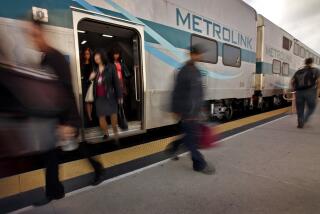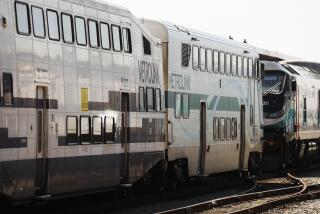Sudden Impact Pitches Commuters Into Chaos
Metrolink conductor Patrick Phillips was standing at his work station early Tuesday, filling out paperwork, keeping track of arrival times. He had counted about 240 tickets when they passed a signal for the train to slow to 25 mph and prepare to switch to another track on their way south.
The train instead made an emergency stop, and then the engineer ran past him, yelling a warning to everyone in the car.
“He said, ‘It’s a big one, it’s a big one!’ ” said Phillips, 49, of Riverside. “ ‘We’re going to get hit!’ ”
In one jarring instant, Phillips and the passengers aboard Metrolink Train 809 found themselves flying through the air, banging into walls and tables and each other in a screaming, bloody whirl. Nearly all of the double-deck train’s 300 commuters suffered some sort of injury and two of them died in a collision with a Burlington Northern Santa Fe freight train.
“It happened so fast for me that I don’t remember the impact myself. I just remember flying through the room and landing on the other side,” Phillips said Tuesday night. He was recuperating from a concussion, bruises and cuts at his parents’ Inland Empire home.
“I yelled at everyone to get down: ‘Buckle up everyone. We’re going to get hit.’ And they pretty much did, at least the ones who could hear me. They were hitting the deck, stowing luggage under their seats. Some had their heads in between their legs in a curled up position. . . . Maybe it worked. I hoped it helped a little.”
Phillips and the others in the lead car who were warned by Engineer Mike Dudgeon’s frantic run from the front of the train had a few seconds to brace themselves. For passengers in the second and third cars, the collision brought a violent end to a routine morning of conversation, reading and napping.
Will Meier, 19, was catching a few extra minutes of sleep in the lead car as he traveled from his Riverside home to morning classes as a freshman at Cal State Fullerton. He was awakened by the engineer’s shouts: “Get down! Get down, right now!” Meier, not fully awake, did as told. “I wasn’t sure what was happening.”
Loydene Keith, 59, was also in the first car, riding near the front as part of her regular commute to Cal State Fullerton, where she is dean of students. Keith likes to sit with other regulars.
Her first inkling of trouble was a hissing. “We looked at each other and said, ‘It sounds like the brakes.’ ”
As the passengers ducked, Keith tucked into the defensive position that flight attendants advise in the event of a rough landing: body forward, head between the knees. Then she scrunched to the edge of her seat and crouched as low as she could, waiting.
The freight train banged into the commuter train, bumping it backward. Then it ran into it again, harder this time, sending passengers bounding.
Jackie Bisesi, 38, of Placentia was watching the collision unfold while buying gas at a nearby station. She heard the freight train’s whistle pierce the morning air--not the usual series of short bursts but a long sustained blast. She ran to the sidewalk to get a better view and saw two trains on one track.
“I couldn’t do anything. I just froze,” Bisesi said.
She started waving her hands. “To warn them, as if they could see me. I screamed, ‘Stop! Stop!’ The ground shook. It felt like the worst earthquake I ever felt. It hit so hard it knocked me back.”
The next few seconds were marked by mostly silence. Then passengers began frantically trying to find ways out of the cars, pounding on windows and doors to get them open.
“People were crawling out the windows and they were coming out the doors,” Bisesi said. “First they were milling around. People were walking around holding their heads, holding their stomachs. They were screaming, crying.” She heard some passengers wondering if it had been a terrorist attack.
Patrick Madden, 37, had been sitting in his usual spot in the middle car, partly out of habit and partly out of a sense that somehow it might be safer. He had just finished making small talk with a commuting buddy, Kevin Barnett, who was sitting across from him, and cracked open the morning paper to read about the latest Anaheim Angels loss. As usual, he sat back to front, leaning sideways.
After the impact, he caught himself at the edge of a table and somehow kept his balance. Barnett had been jammed into the table edge and was moaning about his ribs.
Above Madden on the upper level, Rick Coverdell, 42, of Riverside was also driven into a table. “Next thing I know, I was on the floor. I had the wind knocked out of me.”
Savitha Mandi pulled herself up from the floor and felt pain shoot through her back and left hip. On a normal day, she wouldn’t have been on Train 809 at all. But she’d overslept and missed her train from Corona that connected in Orange to downtown Los Angeles and her job at a mutual fund firm.
So she joined her husband, who takes the later train to his job at an Irvine bank, and was on a cell phone conference call when she was jolted out of her seat.
As she arose, she saw blood splattered over fellow passengers and the car. People were strewn about the floor, some moaning.
Mandi made her way out the door and away from the train to stretch out on the pavement.
“That’s when I saw something had hit us,” Mandi said. “I saw the freight train. It was traumatic. We were all in shock.”
Loydene Keith, who hurt her ribs, back and head, at first thought the train had struck a gravel truck. There was dust in the air and she looked to her friend Cathy, who had blood on her face. There was blood on the conductor’s face too. Mike the engineer stopped momentarily to hold her hand and ask if she was all right.
“I said to Cathy, ‘We’ve gotta get out of here,’ ” Keith said, fearing fire might break out. “[Cathy] said, ‘I can’t move.’ But we dragged ourselves off the train. Then I just went out and laid down on the ground.”
Meier, with a hurt hip, also had trouble getting to his feet. He gave his sweatshirt to another passenger to staunch the flow of blood from gashes on her face. Two men were sprawled near the door, unconscious.
“There was smoke everywhere,” Meier said. “People were screaming. There was a lot of blood everywhere. . . . People were like unconscious all around me. All the window glass shattered. . . . I tried to walk but I couldn’t, so a guy helped me out. I think it was another passenger.
“I laid down in the dirt next to the train and I called my dad.”
His father told him to make sure he got medical attention, and promised that he was on his way. Then Meier called his mother, Secret Meier. He was praying to himself when she answered.
“Mom, get here as soon as you can,” he said, crying into the phone. “There’s all kinds of bloody people around me. My hip hurts really bad.”
Ariele Ray, 48, of Riverside had been deep in a John Grisham novel on the last car’s lower deck when the impact threw her into the headrest of the seat in front of her. “I ended up on the ground, holding my head.”
Her next memory was of people gathered around her, asking if she was OK. It took her a few moments to realize the skin in her forehead was split open--three wounds that would later take 40 stitches at Anaheim General Hospital to close up.
“I thought it was an earthquake. Everything just went slam!” she said. “Then everything seemed like it was moving in slow motion, forward. I could hear people yelling and screaming. And the ambulances were right there. It amazed me.”
Brian Scharr had been driving to Yorba Linda Friends Church, where he is a pastor, when he saw the collision and pulled to a stop. He and other witnesses grabbed a ladder from a truck and headed for the trains to help people get out, Scharr fearing that fire could break out.
Scharr and others moved from car to car trying to sort the confused from the injured. He saw some passengers administering CPR to another passenger.
Other passersby leaped to help. Debbie Campbell, 43, of Anaheim had been stopped at a traffic signal, and she and three men jumped from cars and ran to the train, prying open a door with a 2-by-4 board.
The wreck coincided both with a shift change for the Orange County Fire Authority and with a regional disaster-preparedness drill.
Paramedic Jim Shook and Engineer Darryl Barbee were the first of a wave of rescuers to get through the door of the first car. Shook went left, Barbee went right.
The paramedics cleared the train of the “walking wounded,” as they are known. “We have to lessen the chaos,” Shook explained. He stepped aboard and shouted: “Anybody that can get up, get up!”
Most did. Once those with minor injuries left the train, eight victims who could not walk out on their own remained. Many were moaning, and most were lying on the ground. Few had evident injuries, but appeared to be victims of blunt trauma--internal injuries caused by slamming into tables between the train’s benches.
Some of the injured were silent and still. One was lying face down, his head under a bench and his breathing slow and shallow. Shook maneuvered the man until he could insert a nasal tube to help him breathe.
Outside, 55 ambulances lined up to whisk the wounded to hospitals. Shook told his comrades outside to take his patient first.
“He was breathing a little better,” Shook said. “He was actually moving around a little bit.”
Shook thought the man would survive. He was wrong--the man died about an hour later.
“I never knew his name,” Shook said. “He could never tell me that.”
Outside the crumpled train cars, shock gave way to pandemonium.
Some of the victims, such as Madden, were lucky. His neck hurt--nothing serious, more of a strain, he said. He was cleared to leave the scene on his own after a couple of hours and met his wife and some neighbors, who took him home. His friend, Barnett, wasn’t as lucky; Madden thinks he broke his ribs.
Relatives of some victims were directed to a hastily established family assistance center at the Alta Vista Sports Park, less than a mile from the scene.
Secret Meier went there hoping to find her son. She couldn’t. Then he called again via cell phone to say he was being taken to Placentia Linda Hospital.
The parents went there, but again couldn’t find him. After a wait, hospital officials learned that Meier had been taken to St. Jude Medical Center in Fullerton. The parents were off again, finally catching up with Meier in a physical therapy room.
Secret Meier was crying. “She threw her arms around me and wouldn’t let go,” her son said. “I didn’t want to let them go, either.”
More to Read
Sign up for Essential California
The most important California stories and recommendations in your inbox every morning.
You may occasionally receive promotional content from the Los Angeles Times.












